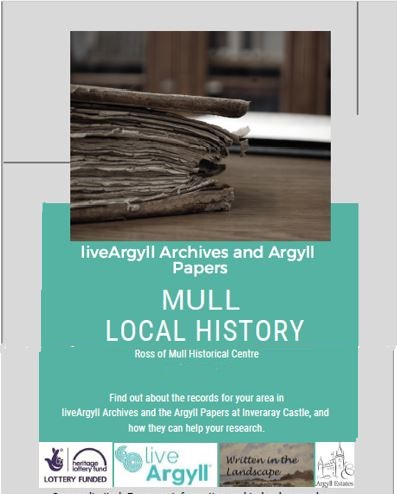
Written in the Landscape – an archives workshop
romhc Monday, 17 June 2019
At the beginning of the year, volunteers at the Historical Centre were excited to receive an invitation to a workshop with the title "Written in the Landscape". The message came from Alison Diamond, Archivist for the Argyll Estates. It read:
As part of the HLF funded Written in the Landscape project, liveArgyll Archives and the Argyll Papers at Inveraray Castle are delivering a local history workshop with a focus on Mull records on Tuesday 12 March, in Mull Museum, Tobermory. Archivists will introduce both collections and the types of records held in them, focusing on the documents we hold which contain evidence about the history of Mull, allowing plenty of time for questions and for getting 'hands on' with the original records that we will bring with us.
Interest was so great that the planning had to be adapted to set up two workshops, simultaneously, at two ends of the island. The lists filled again. And then the weather intervened. The event was rescheduled for 21 and 22 May, with the same team from the mainland delivering it at the Mull Museum in Tobermory and then Bunessan. The fourteen participants at the Historical Centre included colleagues from Pennyghael in the Past and the Iona Heritage Centre.
A presentation from Rory Cruchfield about the Liveargyll Archives made us aware of just what a variety of sources there are to explore: legal records, including court proceedings, financial records like rent books, maps, correspondence formal and informal – including glimpses of family scandals!
The records held by the Argyll Archives also include charters and writs, royal letters, maps and plans, estate papers, family papers, in English, Gaelic and Latin. The space needed for such an archive in Invararay is huge. It was exciting to make a hands-on acquaintance with just some of this material. Thank you, Alison and colleagues for the opportunity. The Mill at Bunessan was built by the Factor for a past Duke of Argyll and that family still own much of the Ross of Mull. We’re grateful for insights received in this workshop and the possibility of following them up.
The Argyll Papers form one of the most important collections in the UK. Their relevance ranges from the minutiae which are so interesting to us for our local history studies, to matters of state. At one point the Dukes of Argyll were virtual rulers in Scotland – for instance exerting major influence over the Deed of Union. The wealth of historical evidence includes not just the history of a powerful family, but of a huge area of the West of Scotland and the people who lived there.
People who live there today still have lively interest in our local history and in the rich resources that can help us to understand it. That’s what brought us together for a day in May.

